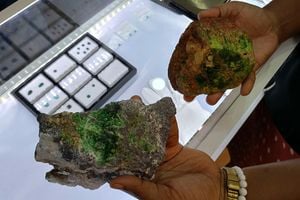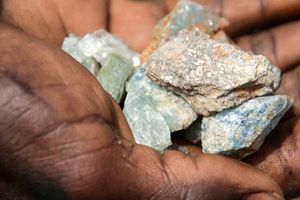
Mining, Blue Economy and Maritime Affairs Cabinet Secretary Hassan Joho
A tug of war between the government and gemstone miners and traders concerning the listing of Tsavorite as a strategic mineral has revealed the lack of transparency in its trading.
Gemstone stakeholders, led by the Kenya Chamber of Mines (KCM), have remained adamant, calling on President William Ruto to reconsider the listing of Tsavorite as a strategic mineral.
The stakeholders want Dr Ruto to rescind the decision saying it would affect the sector. However, the government maintains that its move is meant to protect the sector.
Last year, a gazette notice classified Tsavorite along with other minerals like Cobalt, Copper, and Uranium as strategic, leading to fears of restrictive regulations hindering the industry's growth.
The miners and dealers feel that the classification could stifle the artisanal and small-scale mining sector.
This is despite explanations from officials at the National Mining Corporation (Namico) about the benefits of listing Tsavorite as a strategic mineral.
According to Kenyan law, if a mineral is declared strategic by the Cabinet, it is subject to stringent regulations aimed at safeguarding national interests.
Found in Taita Taveta and Kwale counties, Tsavorite is a garnet whose name was inspired by the Tsavo National Park.
The gemstone is highly valued in the jewellery world due to its stunning green colour and limited availability.
In July, the Ministry of Mining announced that it had initiated the process to reevaluate the classification of Tsavorite as a strategic mineral.
Mining Cabinet Secretary Hassan Joho said the gemstones were rare minerals that are to be protected at all costs hence the listing.
"When something becomes more rare, it becomes strategic. These minerals are found in Kenya alone and we are going to be serious in protecting it," he said.
He said as things stand, several miners under the Kenya Chamber of Mines are not observing laws according to the Mining Act such as payment of royalties and rehabilitation of land.
He said export licenses would not be given until the miners disclose their sources and confirm that they have been paying royalties.
The CS explained that illegal operators are reportedly bypassing legal processes by engaging in mining and trading activities without the necessary approvals.
He said he was keen to ensure the government is no longer losing revenue through illegal exploitation of valuable minerals. He further said unexploited minerals will be extracted so that the country and communities get full benefits from them.
KCM chairperson Patrick Kanyoro had questioned the State Department's failure to consult stakeholders before listing Tsavorite as a strategic mineral.
"Someone tabled the document without properly advising the cabinet, therefore misleading them. The miners have asked the Cabinet Secretary for Mining and the President to do things right. We will present their views to the CS and the President himself," he said.
He also called for transparency and inclusivity in policy decisions that impact livelihoods, criticising the Strategic Minerals 2017 regulations for falling short of public participation.
Namico Chief Executive Officer Edward Omitto explained that the national corporation will play a pivotal role in the exploration and sale of the strategic mineral but assured there will be no monopoly.
He said that by classifying Tsavorite as strategic, the government aimed to safeguard its long-term availability and ensure responsible extraction.
Mr Omito noted that the government has not realised significant revenue from the trade of Tsavorite, hence the need to safeguard it for the benefit of both the government and residents.
"In the recent distribution of mineral royalties by the national government, this county was set to receive only Sh51 million, primarily from iron ore. That means we're losing a lot from this stone because the trade of Tsavorite is not properly documented," he said.
He added that the government plans to protect and patent the stone, branding it for international markets to preserve its originality.
"For a long time, the production of gemstones has been left to the miners, yet there are many challenges. The government must now get involved by offering capacity building and guide the miners to get the stones. The misinformation that Namico will take over the exploitation and sale of Tsavorite is false," he said.
He also assured that Namico would buy and find better markets for stones, especially those that fail to get market due to quality reasons. However, he said the officials would forward the stakeholders' response to the cabinet to reconsider its decision.
The corporation secretary Linet Bunei and Namico director Mark Ngecho added that the corporation would even provide miners with equipment to enhance their operations.
Kasigau MCA Amos Makalo expressed dissatisfaction with Namico's lack of clear communication on how the new law would affect the mining of Tsavorite.







